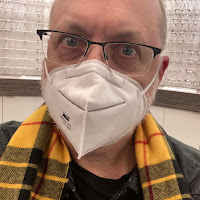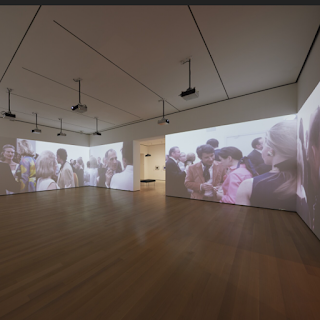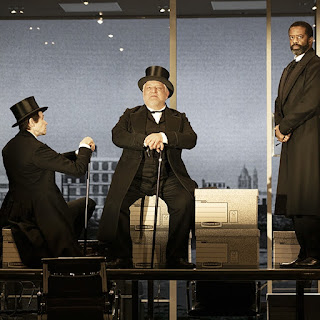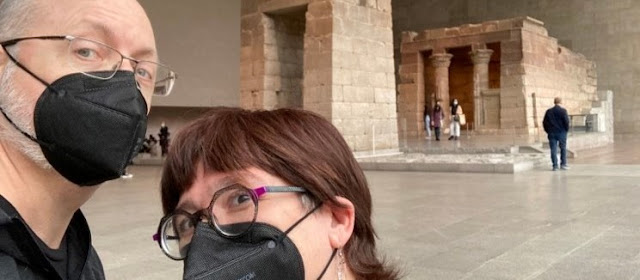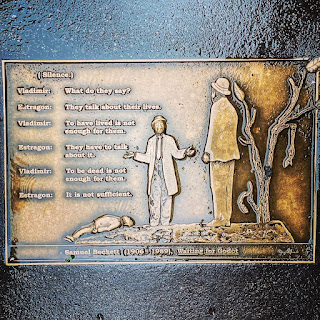 |
Denzel Washington & Frances McDormand
(The Tragedy of Macbeth, 2021) |
Includes spoilers for Joel Coen’s 2021 adaptation of Shakespeare’s “The Tragedy of Macbeth.”
Recently, I have started attending the movies alone. This is something I have never liked to do, and I can even now count the times I have done so on one hand. But it’s becoming a guilty pleasure, made more accessible as my children are away or otherwise occupied, to claim this time for myself.
My favorite movie house is only a five minute drive from my house, Monday nights are five bucks, I get a beer and popcorn (popcorn all to myself, how decadent is that) and settle in. Things being how they are, I often have a row to myself. I feel like a king.
And speaking of kings (how’s that for a segue?) here’s the thing about Shakespeare. Like hearing the cover version of a classic standard, once you know a particular piece –
Macbeth, for example – you no longer need to bend your ear to the language. You just know it, you’ve memorized it as you have a familiar tune or lyric. It opens up your senses to different productions, their interpretations, the design, performance, and so on, and you can even be surprised by words you hadn’t given much thought to before.
However, I am also at a stage in my experience with Shakespeare where I do not need to see certain plays ever again. And I won’t. While I will always seek out a new production of
Hamlet, I never need to see
As You Like It ever again, nor
The Tempest, and certainly not
Macbeth.
 |
Michael Fassbender
(Macbeth, 2015) |
I can find something interesting in even the very worst
Hamlet (and I have seen the very worst
Hamlet) but a bad
Macbeth is tedious.
Enough folks warned me that the 2015 film adaptation of
Macbeth, directed by Justin Kurzel and starring Michael Fassbender and Marion Cotillard was bloated, with an emphasis on visuals and a deep disinterest in the actual language that I didn’t bother to watch it. What’s the point?
However, I rushed to my local move house to see
The Tragedy of Macbeth, directed by Coen brother Joel Coen without consulting the reviews, because I had faith in the director (who chose to use the full title,
as I like to do for my productions) and in its star, Denzel Washington.
Some notable and striking design choices for this adaptation include, most obviously, the use of black and white. Also, it is filmed in 4:3 ratio, like you would for an obsolete television set.
These elements, and especially an entirely non-natural setting, are evocative of the German expressionist filmmakers. I’m thinking specifically of
The Cabinet of Dr. Caligari, which, like,
Macbeth, is a tale of madness and murder. The effect of the artificial sets and narrow field of vision is claustrophobic.
 |
Conrad Veidt & Lil Dagover
(The Cabinet of Dr. Caligari, 1920) |
Coen creates symbolic images using light and shadow, tall stone portals with pointed peaks take the shape of knives; in fact, the “air-drawn dagger” Macbeth sees is not some “fatal vision” but the door handle at the end of a long corridor, catching the light.
This moment is also significant, as Washington strides the length of the corridor, fretting this floating dagger and the murder he is about to commit, the camera cuts from the door to his face to his feet to his hand, the whole time reciting nearly the entire speech, clearly, and uncut.
So many of the important speeches of Macbeth and Lady Macbeth are performed in their entirety, or nearly so. The Coen brothers have always been brilliant with language in their films, but Joel Coen does not here presume his text is superior to that of Shakespeare.
Light and shadow, black and white, the use of confined space, Coen uses his actors and their surroundings like shadow puppets, creating striking images as they move across the screen.
Much well-deserved attention has been given to actor Kathryn Hunter, who plays the wyrd sisters, her preternatural movement and voice being central to the movie’s unsettling sense of the bizarre.
But Coen puts his own unique stamp on this often-interpreted play through his use of the Thane of Ross (Alex Hassell) a tertiary character who in this version, assuming lines from other otherwise unnamed characters, becomes a fly in the ointment. His actions are inscrutable and his motives unclear until the last moment of screentime.
 |
Alex Hassell as Thane of Ross
(The Tragedy of Macbeth, 2021) |
Is this Ross also a witch? His interaction with Hunter, thinly disguised as an “old man” suggests he may have been possessed, or a witch in the form of an ally familiar to Macbeth. As he mounts the stairs towards an emotionally weakened Lady Macbeth, he holds his arms crooked in such a manner that his cloak and figure suggest that of a bird – like one of the ravens which the Weird Sisters employ at several key moments in the film.
Finally, we see him spiriting away Fleance, the son of Banquo, fulfilling the sisters’ prophecy. Those familiar with the story might think this to be an unnecessary conclusion, but what of those who are not? Coming to
Macbeth with no prior knowledge (as no doubt thousands of viewers will) the coronation of the callow Malcolm may seem anti-climactic. The succession of Banquo’s children is central to the plot, but the audience never sees it happen.
Shakespeare’s audience did see it happen, as they knew that their recently crowned King James was a descendant of the historic Banquo, and so do contemporary fans of the play. Coen makes Banquo’s triumph clear and evident, for all to appreciate. The charm's wound up!
"The Tragedy of Macbeth" is now streaming on Apple TV.


